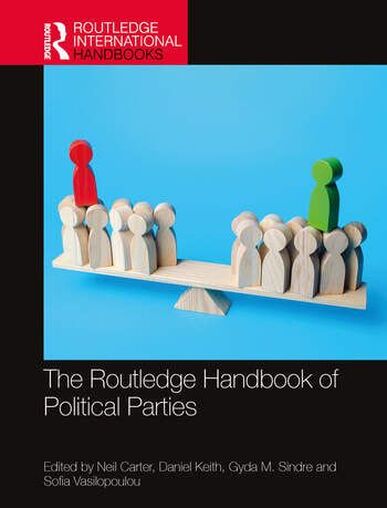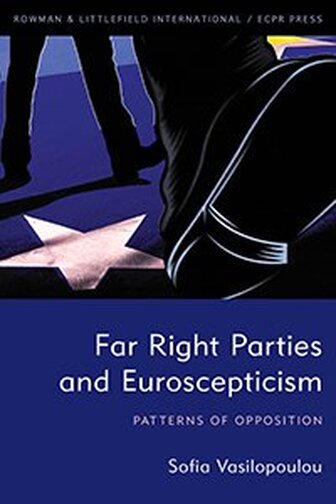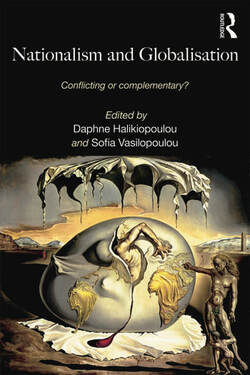Books

The Routledge Handbook of Political Parties. 2023
co-edited with Neil Carter, Gyda M. Sindre and Dan Keith
The Routledge Handbook of Political Parties provides a systematic and comprehensive overview of the study of political parties provided by leading experts in the field. In an era of widespread political disillusionment, political parties are often the main targets of citizen dissatisfaction, yet they are the key institutions that make democracy work. Analysing political parties in unrivalled depth and breath, with comparative thematic chapters throughout, as well as a dedicated section on political parties and party politics in specific country and regional settings, this handbook examines and illuminates the key questions around: how parties organise; how their ideologies have evolved over time; their relationship with society; how they differentiate themselves and how they respond to new social, economic, and political developments.
co-edited with Neil Carter, Gyda M. Sindre and Dan Keith
The Routledge Handbook of Political Parties provides a systematic and comprehensive overview of the study of political parties provided by leading experts in the field. In an era of widespread political disillusionment, political parties are often the main targets of citizen dissatisfaction, yet they are the key institutions that make democracy work. Analysing political parties in unrivalled depth and breath, with comparative thematic chapters throughout, as well as a dedicated section on political parties and party politics in specific country and regional settings, this handbook examines and illuminates the key questions around: how parties organise; how their ideologies have evolved over time; their relationship with society; how they differentiate themselves and how they respond to new social, economic, and political developments.

Far right parties and Euroscepticism: patterns of opposition.
London: ECPR press/Rowman & Littlefield, 2018.
Starting from the assumption that parties are rational vote-maximising actors, the book argues that the way they interpret structural incentives depends largely on the party’s relationship with democracy, its attitude towards the polity, its target electorate/social basis, and its behaviour towards competitors. Classification on these indicators leads to the identification of three far right party models: ‘anti-system’; ‘anti-liberal’ and ‘normalised’. Given that the EU is a core issue in far right parties’ toolkit, it becomes a key policy in party competition. Anti-system parties tend to opt for a rejectionist position on the EU; anti-liberal parties tend to be conditional Eurosceptics; and normalised parties tend to adopt a compromising position on the EU. The specific narrative that a party may employ in order to frame Europe domestically depends on how it perceives national identity.
Nominated for the W.J.M. Mackenzie PSA Book Prize
London: ECPR press/Rowman & Littlefield, 2018.
Starting from the assumption that parties are rational vote-maximising actors, the book argues that the way they interpret structural incentives depends largely on the party’s relationship with democracy, its attitude towards the polity, its target electorate/social basis, and its behaviour towards competitors. Classification on these indicators leads to the identification of three far right party models: ‘anti-system’; ‘anti-liberal’ and ‘normalised’. Given that the EU is a core issue in far right parties’ toolkit, it becomes a key policy in party competition. Anti-system parties tend to opt for a rejectionist position on the EU; anti-liberal parties tend to be conditional Eurosceptics; and normalised parties tend to adopt a compromising position on the EU. The specific narrative that a party may employ in order to frame Europe domestically depends on how it perceives national identity.
Nominated for the W.J.M. Mackenzie PSA Book Prize

The Golden Dawn’s ‘nationalist solution’: Explaining the rise of the far right in Greece.
New York: Palgrave McMillan, 2015 (with Daphne Halikiopoulou)
What explains the dramatic rise of the extreme, ultranationalist Golden Dawn in a country that has experienced Nazi invasion and a military dictatorship? This book places the rise of the Golden Dawn in the context of the Eurozone crisis and argues that its rise is not merely the product of economic malaise. Rather, the success of the Golden Dawn is dependent on the extent to which it was able to propound plausible solutions to the three sets of crises - economic, political and ideological - that culminated in an overall crisis of democracy in Greece.
The authors argue that much of the party's success can be attributed to its strategic choice to tap into the widespread disillusionment of the Greek people by offering them a 'nationalist solution': a rhetoric that emphasizes the twin fascist myths of social decadence and national rebirth.
New York: Palgrave McMillan, 2015 (with Daphne Halikiopoulou)
What explains the dramatic rise of the extreme, ultranationalist Golden Dawn in a country that has experienced Nazi invasion and a military dictatorship? This book places the rise of the Golden Dawn in the context of the Eurozone crisis and argues that its rise is not merely the product of economic malaise. Rather, the success of the Golden Dawn is dependent on the extent to which it was able to propound plausible solutions to the three sets of crises - economic, political and ideological - that culminated in an overall crisis of democracy in Greece.
The authors argue that much of the party's success can be attributed to its strategic choice to tap into the widespread disillusionment of the Greek people by offering them a 'nationalist solution': a rhetoric that emphasizes the twin fascist myths of social decadence and national rebirth.

Nationalism and Globalisation: Conflicting or Complementary?
Oxon; New York: Routledge, 2011 (co-edited with Daphne Halikiopoulou)
Nationalism and globalisation are two central phenomena of the modern world, that have both shaped and been shaped by each other, yet few connections have been made systematically between the two.
This book brings together leading international scholars to examine the effect of globalisation on nationalism, and how the persistence of the nation affects globalisation. With a range of case studies from Europe, the US and Asia, the authors focus on the interaction between globalisation, national identity, national sovereignty, state-formation and the economy.
With an interdisciplinary approach, Nationalism and Globalisation will be of interest to students and scholars of political science, sociology, history, economics and international relations.
Oxon; New York: Routledge, 2011 (co-edited with Daphne Halikiopoulou)
Nationalism and globalisation are two central phenomena of the modern world, that have both shaped and been shaped by each other, yet few connections have been made systematically between the two.
This book brings together leading international scholars to examine the effect of globalisation on nationalism, and how the persistence of the nation affects globalisation. With a range of case studies from Europe, the US and Asia, the authors focus on the interaction between globalisation, national identity, national sovereignty, state-formation and the economy.
- Part one provides theoretical reflections on the flexibility and plasticity of the terms nationalism and globalisation focusing on the ways in which nationalism has shaped and has been shaped by globalising forces.
- Part two examines the relationship between nationalism and globalisation in different historical eras and different regions, questioning established approaches.
- Part three focuses on contemporary issues including the economic crisis, labour migration and citizenship and the theme of global culture.
With an interdisciplinary approach, Nationalism and Globalisation will be of interest to students and scholars of political science, sociology, history, economics and international relations.
